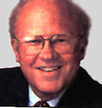
One Minute Manager
by Ken Blanchard
Self-directed work teams function in ways that only managers
have done in the past.
Replacing the Old Hierarchy
In our book, Empowerment Takes More Than a Minute, John Carlos, Alan Randolph
and I contend that the first two key steps for empowering people are: sharing
information with everyone and creating autonomy through boundaries. The
third key step involves developing self-directed teams that can eventually
replace the old hierarchy.
What's wrong with the old hierarchy when it comes to empowerment? In the
past, information was passed down the hierarchy to the people doing all
the work (i.e., making, selling and servicing the product and the like).
When problems occurred, these people were expected to communicate their
concerns back up the hierarchy to the decision makers. Then, once a problem
was solved, the solution was passed down the hierarchy.
Today, in the time it takes for this process to occur, your customer will
be gone. An empowered organization is one that gives the people closest
to the problem the authority to solve it. An organization that gives importance
to self-directed work teams has numerous flexible and relatively permanent
work teams whose important relationships are horizontal (i.e., related to
customers, suppliers and internal colleagues).
It no longer works to have people segmented into functions that only control
part of an organizational process. Each team should consist of employees
who are responsible for an entire process, product or customer relationship.
They should plan, perform and manage the work from start to finish. While
a group may have a manager or "coach," everyone should share the
responsibilities equally.
For example, Blanchard Training and Development is starting to use self-directed
work teams that focus on customers. In the past, a salesperson developed
a relationship with a customer and then had to fight across departmental
fiefdoms to get the customer served properly. Accounting fought to hold
on to their policies even though it might not have made sense concerning
the customer being served. Product development and shipping wanted to protect
their ways of doing business, as well.
In the future, my company's customers will be handled by a cross-functional
team, which will include a salesperson, a trainer/consultant, a member of
our accounting department, someone from shipping and the like. The team
will be the sensing arm and problem-solving resource of our company in regard
to our customers.
Team members will address deficiencies in our company's customer service.
When a problem or need arises, the team will immediately gather the necessary
information and begin to fix the problem. They will be held accountable
for how they handle customer concerns. Team members will focus on the customer,
not on traditional functional areas or the old hierarchy.
Self-directed work teams function in ways that only managers have done in
the past (i.e., assessing information, then acting in a responsible way
that keeps everyone informed). For teams to become self-directed and empowered,
they must learn to:
 Make decisions as a team.
Make decisions as a team.
 Resolve conflict.
Resolve conflict.
 Share leadership.
Share leadership.
 Manage themselves responsibly.
Manage themselves responsibly.
 Achieve more with less.
Achieve more with less.
It's important to note that teams don't become self-directed and empowered
overnight. They must learn to function as a team rather than as individuals.
High-performance individuals brought together from various functional areas
don't guarantee a high-performance team. That's why when we help an organization
become empowered, we teach everyone how to create a high-performance team,
putting them through a process that helps them obtain their goal.
Just as boundaries permit autonomy to develop, understanding the stages
of group development, and the kind of leadership needed during each stage,
permits teams to function effectively. Empowerment takes more than a minute
because it's a journey, not just an announced destination.
About the author
Ken Blanchard is co-author of the best-selling One Minute Manager
series of books. He has written and co-authored 11 other books. His latest
book is Everyone's a Coach, co-authored with Don Shula.
© 1996 by Blanchard Management Report, Blanchard Training and Development
Inc., Attn.: Bob Nelson, Publisher, 125 State Place, Escondido, CA 92029.
Past articles, interviews and subscriptions are available. Telephone (800)
728-6000, ext. 528, fax (619) 489-8407.









 Make decisions as a team.
Make decisions as a team. Resolve conflict.
Resolve conflict. Share leadership.
Share leadership. Manage themselves responsibly.
Manage themselves responsibly. Achieve more with less.
Achieve more with less.


